I want to get the currently running Android Emulator's IP address through code. How can it be achieved?
-
1Perhaps related [here](http://stackoverflow.com/questions/7447221/how-to-connect-to-avd) and [here](http://stackoverflow.com/questions/13217796/is-android-avds-firewall-somehow-more-restricted-to-real-android-firewall). – hhh Nov 05 '12 at 13:29
-
@hhh Second link is broken. :) – Muhamed Huseinbašić Apr 17 '15 at 14:57
-
1@MuhamedHuseinbašić I feel this thread solved the problem in the second thread so decided to delete it to keep things simple. – hhh Apr 20 '15 at 13:29
7 Answers
Just to clarify: from within your app, you can simply refer to the Emulator as "localhost" or 127.0.0.1.
Web traffic is routed through your development machine, so the Emulator's External-IP is whatever External-IP has been assigned to that development machine by your internet-provider. The development machine can always be reached from your device at 10.0.2.2.
If you have multiple Emulators launched, where adb does not work,
unless you pick one by Emulator's Local-IP (like adb -s 192.168.232.2:5555 shell), then:
- Just like a real Android device,
- In Emulator, swipe down from top-most, to open menu,
- In the menu, press and hold on WiFi,
- Finally, go to settings of current WiFi-connection,
- There you should see IP of Emulator process.
- 7,611
- 5
- 39
- 71
- 43,056
- 28
- 105
- 132
-
10I want to upvote you 100 times for this. I couldn't figure out how my app could talk to another local server I had running until I read your post. Thanks! – Spike Jan 08 '11 at 02:21
-
How can you reach your development machine from 10.0.2.2? I tried pinging but nothing, pic [here](http://i.stack.imgur.com/Yjv7W.jpg). Ifconfig -app on the right and terminal-emulator on the left trying to ping dev-machine. Cannot see anything in localhost, any simple tests? – hhh Nov 05 '12 at 13:21
-
@hhh You can try JuiceSSH: https://play.google.com/store/apps/details?id=com.sonelli.juicessh You can reach your host from the mentioned IP or from the real IP of the host. Both variants work for me. – Muhamed Huseinbašić Apr 17 '15 at 15:11
-
I believe the traffic from an emulator is routed over a "virtual" router first (with IP address of `10.0.2.1`, not directly. So, there should be one extra connection takes place between this router `10.0.2.1` to the host/dev machine `127.0.0.1/10.0.2.2`. What I really usually change the port number I want to connect to. – stdout Apr 17 '20 at 09:35
If you do truly want the IP assigned to your emulator:
adb shell
ifconfig eth0
Which may give you something like:
eth0: ip 10.0.2.15 mask 255.255.255.0 flags [up broadcast running multicast]
Or, if above fails, try:
adb shell
ifconfig wlan0
And look for
inet addr:in the output, for example, my Emulator logsinet addr:192.168.232.2
- 7,611
- 5
- 39
- 71
- 1,837
- 17
- 15
-
[Luise](https://stackoverflow.com/users/6066443/louise) said: *I tried Derek method. it can ping within adb shell*. – Tobi Nary Mar 15 '16 at 12:47
-
10I get this error after `adb shell`: `ifconfig: eth0: No such device`any ideas why? – awavi Jun 09 '17 at 18:58
-
5
Like this:
public String getLocalIpAddress() {
try {
for (Enumeration<NetworkInterface> en = NetworkInterface.getNetworkInterfaces(); en.hasMoreElements();) {
NetworkInterface intf = en.nextElement();
for (Enumeration<InetAddress> enumIpAddr = intf.getInetAddresses(); enumIpAddr.hasMoreElements();) {
InetAddress inetAddress = enumIpAddr.nextElement();
if (!inetAddress.isLoopbackAddress()) {
return inetAddress.getHostAddress().toString();
}
}
}
} catch (SocketException ex) {
Log.e(LOG_TAG, ex.toString());
}
return null;
}
Check the docs for more info: NetworkInterface.
- 68,043
- 8
- 59
- 60
Use this method you will be getting 100% correct ip address for your android emulator
To get the ip address of yoor emulator
Go to adb shell and type this command
adb shell
ifconfig eth0

After running this command I am getting
IP : 10.0.2.15
Mask : 255.255.255.0
Which works for me . I am also working for an networking application.
- 26,128
- 21
- 90
- 126
-
2The emulator no longer has 'eth0', but has 'radio0' and 'wlan0' instead. You may want to edit this answer, because it is no longer 100% correct. – Adam Howell Apr 07 '21 at 22:47
-
If you need to refer to your host computer's localhost, such as when you want the emulator client to contact a server running on the host, use the alias 10.0.2.2 to refer to the host computer's loopback interface. From the emulator's perspective, localhost (127.0.0.1) refers to its own loopback interface.
More details: https://developer.android.com/studio/run/emulator-networking#networkaddresses
- 9,564
- 146
- 81
- 122
- 1,755
- 18
- 22
public String getLocalIpAddress() {
try {
for (Enumeration < NetworkInterface > en = NetworkInterface.getNetworkInterfaces(); en.hasMoreElements();) {
NetworkInterface intf = en.nextElement();
for (Enumeration < InetAddress > enumIpAddr = intf.getInetAddresses(); enumIpAddr.hasMoreElements();) {
InetAddress inetAddress = enumIpAddr.nextElement();
if (!inetAddress.isLoopbackAddress()) {
return inetAddress.getHostAddress().toString();
}
}
}
} catch (SocketException ex) {
Log.e(LOG_TAG, ex.toString());
}
return null;
}
- 26,128
- 21
- 90
- 126
- 41
- 1
Within the code of my app I can get the running device IP andress easily like beolow:
WifiManager wm = (WifiManager) getSystemService(WIFI_SERVICE);
String ip = Formatter.formatIpAddress(wm.getConnectionInfo().getIpAddress());
- 21,001
- 12
- 102
- 104